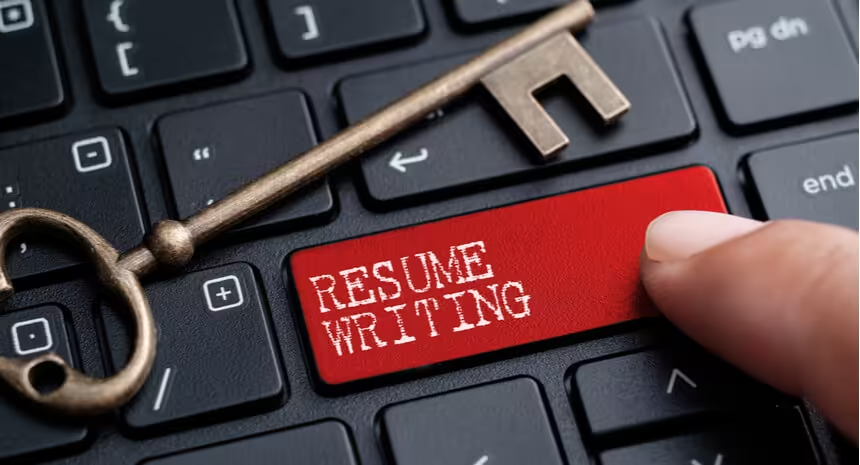Have you ever wondered why some teams accomplish amazing things while others struggle to meet basic standards? The not-so-secret ingredient is collaboration skills.
Collaboration skills are the glue that holds teams together. They enable individuals to harness diverse perspectives, talents and energies, transforming a group of people into a cohesive, innovative force.
Wondering how to make the most of your particular collaborative abilities? You’ve come to the right place.
Here’s what we’ll cover:
- The definition of collaboration skills.
- Many examples of collaboration skills.
- How to add these skills to your resume.
- Tips for improving your collaboration skills.
- Additional resources for other skill sets.
Are you refreshing your resume? Consider using a AI resume builder. These handy tools are not only efficient for structuring your resume but they also offer a variety of examples of collaboration skills that you can seamlessly integrate into your resume with just a few clicks.
What are collaboration skills?
Collaboration skills are the abilities and traits that enable individuals to work effectively with others toward a common goal. Great collaborators have the ability to communicate clearly, resolve conflicts, adapt to changing circumstances and inspire teamwork.
Why are collaboration skills important? Many, if not most, of the things we do at work and in our day-to-day lives require working closely with others. According to Zippia, more than 50% of workers say their job relies on collaboration. No person is an island.
And this is true in nearly every industry. Whether you work in information technology, healthcare or banking, collaboration skills will come in handy.
Next, let’s walk through some examples of this skill set.
30+ collaboration skills [examples for your resume]
Collaboration skills come in different flavors. There are soft skills like empathy, active listening and adaptability, and hard skills like project coordination, scheduling and resource allocation.
Many of these would be considered transferable skills, which can help you excel in various roles across different industries, enhancing your employability and career progression.
We can get even more detailed in this analysis. Let’s run down different types of collaboration skills and provide examples of each one.
Communication
The more interconnected the world becomes, the more important communication skills become. Without communication, you can’t collaborate well. Here are a few of the collaboration skills that fall under the umbrella of communication:
- Articulating ideas clearly
- Giving and receiving feedback
- Nonverbal communication
- Persuasive speaking
- Technical writing
Conflict resolution
Resolving conflicts isn’t about making everyone feel good. It’s a complex challenge made easier when you possess conflict-resolution skills. Here are a few skills that match this description:
- Negotiation
- Mediation
- Diplomacy
- Emotional regulation
- Assertiveness
Problem-solving
Effective problem-solving in collaboration requires a mix of creativity and logical analysis to find solutions that satisfy all parties involved. Here are some problem-solving skills that help with collaboration:
- Root cause analysis
- Creative thinking
- Logical reasoning
- Consensus building
- Critical thinking
Project management
Anyone with strong project management skills certainly has a few collaboration skills in their toolbelt. These skills are essential for coordinating efforts, meeting deadlines and achieving objectives. Here is a list of project management skills that fit here:
- Task delegation
- Time management
- Risk assessment
- Resource allocation
- Milestone tracking
People skills
At the core of collaboration is working with others and appreciating the unique strengths each individual brings to the table. That’s why people skills are so important for meaningful collaboration. Here are some collaboration skills that would qualify for this category:
- Empathy
- Social awareness
- Respectfulness
- Team motivation
- Cultural sensitivity
Leadership skills
Effective leadership is about more than just directing others — it’s about fostering an environment where collaborative efforts thrive. Here are some leadership skills that fall under the umbrella of collaboration:
- Inspiring others
- Visionary thinking
- Coaching and mentoring
- Strategic decision-making
- Change management
How to add collaboration skills to your resume
Learning to champion your skill set can make a huge difference in your job search, starting with your resume.
Adding specific skills to your resume will help you align your capabilities with the employer’s needs. Many companies use automated resume scanning software (applicant tracking systems — known as ATS) that looks for certain keywords. Including the right skills will help your resume break through the initial screenings.
The first step is to read the job listing closely.
Step 1Find skills in the job listing
The job listing is your map to understanding exactly what the employer is looking for in a candidate. How else would you know what the employer wants?
Read the job listing closely, and bold or highlight every skill you come across.
Here’s what that would look like (with the skills in bold):
Position: Marketing Coordinator
Join our team to help drive company success through effective teamwork, creativity and strategic thinking. We’re looking for a candidate who excels in a fast-paced environment and possesses strong communication skills, both written and verbal.
Responsibilities:
- Work closely with the sales team to develop and implement marketing strategies.
- Coordinate and engage with design and content teams to produce high-quality materials.
- Manage multiple projects simultaneously, ensuring they align with the company’s objectives and timelines.
- Regularly liaise with stakeholders about project status, offering solutions to any issues that arise.
Requirements:
- Proven ability to work collaboratively with various teams.
- Strong interpersonal skills and ability to present ideas clearly.
- Experience in managing projects with a cooperative approach.
- Ability to adapt and resolve conflicts in dynamic conditions.
Once you’ve highlighted the skills, it’s time to add them to your resume.
Take the time to learn more about the company beyond just the job listing. Check out their website, read recent news articles about them and explore their social media profiles. Knowing the company’s culture, values and recent activities can help you throughout the entire job application process.
Add a skill sections
Let’s start with the most obvious area to add your skills — the skills section.
Skills sections come in a variety of forms. They might use bullet points or be broken into subsections like technical skills and computer skills. You might add a second, more robust skills section called core competencies.
Simply add the collaboration skills most relevant to the job you’re interested in, and that’s all there is to it.
If you’re transitioning between industries or just beginning your career, think about creating a skills-based or functional resume. This format highlights your skills, allowing you to showcase your collaboration abilities and other relevant strengths more prominently.
Sprinkle skills throughout the rest of your resume
Think of your skills as the thread tying your resume together.
Here are some of the resume sections that could serve as a forum for highlighting your collaboration skills:
That last one is very important. Most likely, your work experience makes up the bulk of your resume. Each of your current and previous jobs offers a trove of skills to highlight.
Here’s what a work history entry might look like with the collaboration skills in bold:
Marketing Coordinator
ABC Company, New York, NY
January 2018 – June 2024
- Developed and implemented marketing strategies, effectively coordinating and engaging with sales, design and content teams to ensure alignment with company goals.
- Liaised with stakeholders regularly to communicate project statuses and collaborated on problem-solving to address challenges promptly.
- Managed multiple project timelines simultaneously, demonstrating strong teamwork and interpersonal skills.
- Fostered a cooperative team environment that encouraged open communication and efficient resolution of conflicts.
Great. Now that you know how to improve your resume, let’s talk about improving your skill set.
Tips for improving your collaboration skills
Even if you’re everyone’s “Collaborator of the Year,” there are ways to make your skills even more powerful.
Let’s run through a few of the tried-and-true strategies for improving your collaboration skills:
- Learn about communication styles: Take a course in interpersonal communication on a platform like Coursera or LinkedIn Learning to understand the breadth of communication styles you’ll likely encounter as a collaborator.
- Mind your body language: Nonverbal cues often communicate as much as words. Pay close attention to your body language to determine whether it matches your words.
- Seek honest feedback: Ask someone you trust to share their thoughts on your collaborative methods and communication effectiveness. Consulting with others can help create a truer understanding of yourself.
- Join a debate club or group: Participating in debates is a powerful way to enhance your articulation, quick thinking and persuasive communication. Alternatively, join a group like Toastmasters, where you can practice public speaking.
- Participate in role-playing: Engage with friends or colleagues in role-play scenarios that challenge your communication abilities. This can include job interview simulations, giving feedback or handling difficult conversations.
As we wrap up, we’ll share some additional resources and key takeaways that’ll help you uplevel your skill set.
More skills resources
Haven’t found what you’re looking for? Maybe one of our other skills guides can help:
Collaboration skills — key takeaways
-
Understand and adapt to communication styles
Recognizing and adapting to different communication styles will make you a better collaborator.
-
Seek and provide constructive feedback
Feedback is a two-way street in collaboration. Providing thoughtful, constructive feedback and being open to receiving feedback can drive personal and team growth.
-
Learn how to resolve conflict
Collaboration skills can always be improved. Engaging in regular practice through role-playing or debate club will only help you.
-
Keep learning and growing
Continuously seek opportunities for professional development through workshops, online courses and certification programs, and stay updated with the latest technological tools.
Was this information helpful? Let us know!
Don is a Certified Professional Resume Writer (CPRW) with more than 10 years’ experience creating digital content, including four years helping job seekers develop their careers. He holds an M.S. in Journalism from Northwestern University.
More resources

How to Write a Resume: Guide & Examples for 2025
If you re wondering how to write a resume that grabs attenti...

Should You Put Your Address on Your Resume? (Guide + 5 Example Resume Headers)
Should you put your address on your resume? We ll answer you...

Interior Design Resume: Examples, Templates & Tips for 2025
In interior design first impressions are important. Make head...

Professional Project Coordinator Cover Letter Sample & Writing Guide
Our guide will help you build a project coordinator cover lett...

Teacher Resume: Examples, Templates & Tips
Need a teacher resume to help land you a role in the right cla...

